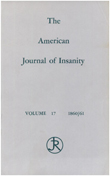Alcoholism in manic-depressive (bipolar) illness: familial illness, course of illness, and the primary-secondary distinction [published erratum appears in Am J Psychiatry 1995 Jul;152(7):1106]
Abstract
OBJECTIVE: This 5-year follow-up study was designed to explore the factors that might lead to alcoholism in patients with bipolar disorder. METHOD: The authors studied patients with bipolar illness (70 with alcoholism and 161 without), their relatives, and a comparison group composed of relatives' acquaintances. All were evaluated with versions of the Schedule for Affective Disorders and Schizophrenia, and diagnoses were made according to the Research Diagnostic Criteria. Thirty of the bipolar alcoholic patients whose affective disorder was primary were also compared with 34 whose alcoholism was primary. RESULTS: Alcoholism was more frequent in the bipolar patients than in the comparison subjects. There no significant differences between the alcoholic and nonalcoholic bipolar patients in family history of alcoholism or affective disorders, suggesting that bipolar illness with alcoholism is not explicable by a family history of alcoholism and that the alcoholism seen in bipolar illness is dissimilar to alcoholism as a primary disorder. Alcoholism associated with bipolar illness was more likely to remit than primary alcoholism. There was no significant difference in family history between the patients with primary alcoholism and those with primary bipolar disorder. The patients with primary alcoholism had significantly fewer episodes of affective disorder during followup, suggesting that their type of bipolar illness was less severe and may have needed the added insult of alcoholism to make it manifest. CONCLUSIONS: The study supports the idea that not all alcoholism is primary with a corresponding familial diathesis. Rather, alcoholism associated with bipolar disorder is often a secondary complication.
Access content
To read the fulltext, please use one of the options below to sign in or purchase access.- Personal login
- Institutional Login
- Sign in via OpenAthens
- Register for access
-
Please login/register if you wish to pair your device and check access availability.
Not a subscriber?
PsychiatryOnline subscription options offer access to the DSM-5 library, books, journals, CME, and patient resources. This all-in-one virtual library provides psychiatrists and mental health professionals with key resources for diagnosis, treatment, research, and professional development.
Need more help? PsychiatryOnline Customer Service may be reached by emailing [email protected] or by calling 800-368-5777 (in the U.S.) or 703-907-7322 (outside the U.S.).



